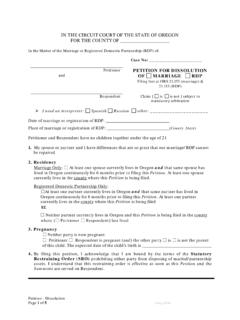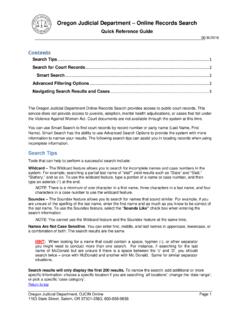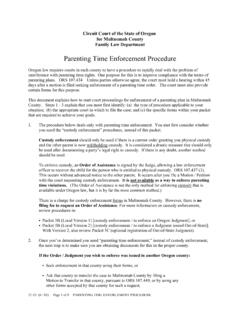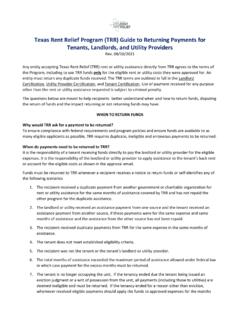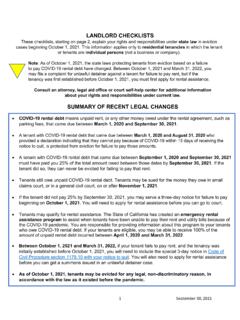Transcription of RESIDENTIAL EVICTION MORATORIUM INFORMATION …
1 FED Instructions for Landlords Page 1 of 5 (Nov 2018) RESIDENTIAL EVICTION INFORMATION FOR LANDLORDS An EVICTION is formally called an FED (Forcible Entry and Detainer). It is a complaint filed with the court to remove a tenant from property owned or managed by the person filing the complaint. This form is for RESIDENTIAL evictions only DO NOT use this form for a commercial property, group home, farm, vacation rental, social or fraternal home, or to remove a squatter. COURT CLERKS CANNOT GIVE LEGAL ADVICE!
2 landlord /Tenant law is very complex and detailed. Most of the laws are in chapters 90 and 105 of the Oregon Revised Statutes (ORS). You must also follow other laws, procedures, and prior appellate court decisions, including the Oregon Evidence Code (OEC), the Uniform Trial Court Rules (UTCR), and the Oregon Rules of Civil Procedure (ORCP). ( ). If you do not follow the laws exactly, the court may order you to pay the tenant s lawyer fees. You are strongly urged to talk to a lawyer before you try to file an EVICTION on your own.
3 Contact the Oregon State Bar at or (in Oregon) or go to for INFORMATION and help finding a lawyer. Following these instructions will not guarantee that you win your case. These instructions are general and may not apply in a given situation. YOU are responsible for getting legal advice about how to properly evict a tenant. These forms do NOT provide legal advice and the Oregon Judicial Department is not responsible for the outcome of your case if you rely on these forms. The landlord is the plaintiff, and the tenant is the defendant throughout the case A judgment for the plaintiff ( landlord ) will be for return of the property and the costs of filing and serving the complaint.
4 To collect back rent or damages, you must file a separate civil complaint. A judgment for the defendants (tenants) generally means that they do not have to move out of the property. It may also include the cost of responding to the complaint and lawyer fees. Fees If you are low-income, you can ask the court to defer or waive payment of filing fees. Fill out and submit an Application and Declaration for Deferral or Waiver of Fees, and an Order Regarding Deferral or Waiver of Fees to the court clerk when you file your RESIDENTIAL EVICTION Complaint.
5 Your complaint will not be filed until you have paid the filing fee or the court grants your application for deferral or waiver. FIRST: Give the defendant (tenant) an EVICTION notice You must give written notice to the defendant (tenant) Your notice must be properly prepared and follow both the statutes (laws) and your rental agreement. You should talk to a lawyer about how you can give the defendant (tenant) notice. Not all notices can be delivered in the same way. FED Instructions for Landlords Page 2 of 5 (Nov 2018) Specific laws may allow you to proceed with another type of notice or no notice in some situations.
6 Talk to a lawyer about these kinds of evictions . Before you file a Complaint with the court, you must give one of the following notices to the defendant (tenant) in writing and the time period in the notice must have ended: a) 24-Hour Notice (personal injury, substantial damage, or extremely outrageous act) (ORS ) b) 24-Hour Notice (unlawful occupant) (ORS ) c) 24-Hour Notice (perpetrator of domestic violence, sexual abuse, or stalking) (ORS ) d) 24/48-Hour Notice (drug or alcohol program violation) (ORS ) e) 72-Hour or 144-Hour Notice (nonpayment of rent) (ORS ) f) 7-Day Notice (week-to-week tenancy, with cause) (ORS ) g) 10-Day Notice (week-to-week tenancy, no cause) (ORS (2)) h) 10-Day Notice (pet violation)
7 (ORS ) i) 10-Day or 20-Day Notice (repeat violation) (ORS * or (4)) j) 30- or 60-Day Notice (month-to-month tenancy without stated cause) (ORS (3) or (4)) k) 180-Day Notice (month-to-month tenancy without stated cause) (ORS ) l) 30-Day Notice (month-to-month stated cause) (ORS *, or ) m) 60-Day Notice (manufactured or floating home stated cause) (ORS ) * If the tenancy is week-to-week, refer to ORS (6) for specific timing rules. Fill in the Other Notice section on the Complaint. Read the referenced statutes (laws) carefully!
8 Go to Chapter 90 of the Oregon Revised Statutes - If you have questions about which type of notice you need to give, see a lawyer or contact the Oregon State Bar at or (in Oregon) , or go to Notices can be purchased at most office supply stores. You can write the notice yourself if all of the INFORMATION required by the law is included. Timing of the notice deadline Your notice must specify the date and time that it expires. You must give the defendant (tenant) the amount of time required by the laws.
9 When counting time, Day 1 is the day after notice is given. If you mail the notice, add 3 days to the minimum time required by the law (see list above). So if you are mailing notice, you must allow 4 days before you begin counting the defendant (tenant) s time to respond. If your notice period is given in hours rather than days (in the list above or other law you are using), then the time begins immediately when you give notice except For 72-hour or 144-hour non-payment notices, the time begins at 11:59 pm on the day you serve.
10 Talk to a lawyer for INFORMATION about this type of service. The last day does not end until midnight. SECOND: File a RESIDENTIAL EVICTION Complaint if necessary FED Instructions for Landlords Page 3 of 5 (Nov 2018) After the time specified in the notice has passed, if the defendant (tenant) has not left the property you may file a Complaint with the court for the county where the property is located. To file a complaint, complete the RESIDENTIAL EVICTION Complaint and Summons forms and file them with the court clerk.



